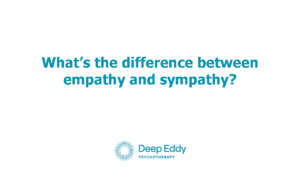Tori Olds, a therapist at Deep Eddy Psychotherapy in Austin, TX, talks about really showing up for someone to bridge an emotional gap for them and how this integration is actually what we aim to create within ourselves.
Sympathy vs Empathy: How Do They Differ?
Understanding the subtle differences between sympathy and empathy can open up new ways to connect emotionally with others. As you continue reading, you’ll uncover how these two responses shape our relationships in distinct ways.
Sympathy Can Come off More Like Pity
Sympathy is more like, “Oh, you poor thing. It’s so hard for you. I can’t even imagine how hard that is.” It’s a little bit distancing and often it doesn’t feel as good. It can come off more like pity.
Empathy is About Really Being Present with a Person
Empathy feels like, “I’m gonna join you. I really know what it’s like to be sad. I haven’t lost a sibling, but I know what a loss feels like. I’m gonna access the moment with you. I’m going to access a bit of what that must feel like so that I can really be present with you, going into it with you.”
That joining of empathy—that real connection—is much more selfless, it’s much deeper and more intimate and it just feels better to the receiver. I love the idea of integration because it works on all levels.
Individual Pieces Make Up a Stronger Whole
If we are really geeking out, one day, then we could talk about complexity theory and how integration comes from complexity theory. It’s about individual pieces making up a stronger whole. Whether it’s the earth or the family; computers even. When we talk about complexity theory, there are individual elements that can and are different and unique. They have their own thing, their own niche capacity and what they’re bringing to the table is unique. Yet, they’re all working together and showing up and connecting and having a conversation which adds to the whole. That integration of parts creates more sophistication, more of what they call complexity, which is a good thing. That’s another way of saying what we’re going for in therapy, which is more complexity in your own system.
An Example of Empathy in Relationships
So, this becomes relevant when applied to relationships. If I have a friend who needs my empathy, it’s as though I’m both letting myself really be myself—the individual piece—but I’m also linking over, connecting, and bridging the gap.
Perhaps my friend was broken up with. In that moment, I’m having access to thoughts that she doesn’t have access to right then. Those thoughts might be hope, groundedness, and strength because I’m not losing it, I’m not caught up in those hurtful feelings. Yet, I’m turning to her just like I’m feeling her pain with her. I’m really bridging that gap, I’m really going over the same thing with her and I’m linking with her.
When two minds can do that, that’s integration of relationship. That actually is the definition of a healthier relationship. So, that is what I’m bringing in therapy. I’m my own person. I’m the therapist and I have other insights and things to bring. The person I’m talking with has their part like what’s going on inside. But when we come together, we’re synergized. It creates something that either mind couldn’t do independently.
So, this empathetic integration that we offer to others is very similar to what we want to do with ourselves, where all of the parts of our self are showing up, integrating, and working together.
Starting Therapy in Austin, TX
We would love to invite you to make a complimentary call to discuss some of your options and determine whether Deep Eddy Psychotherapy in Austin, TX is the right fit for you and your situation. Please contact us using the links below or in the sidebar and share this post or video if you found it to be valuable. Together we can create a world of well-being and joy.

